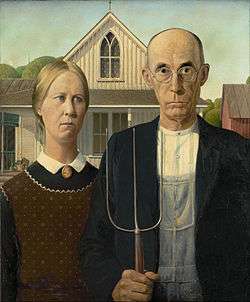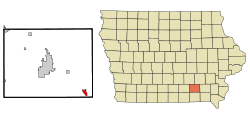Eldon, Iowa
Eldon is a city in Wapello County, Iowa, United States. The population was 927 at the 2010 census. Eldon is the site of the small Carpenter Gothic style house that has come to be known as the American Gothic House because Grant Wood used it for the background in his famous 1930 painting American Gothic.[4]
Eldon, Iowa | |
|---|---|
 American Gothic | |
 Location of Eldon, Iowa | |
| Coordinates: 40°55′4″N 92°13′13″W | |
| Country | |
| State | |
| County | Wapello |
| Area | |
| • Total | 1.12 sq mi (2.90 km2) |
| • Land | 1.11 sq mi (2.88 km2) |
| • Water | 0.01 sq mi (0.02 km2) |
| Elevation | 620 ft (189 m) |
| Population | |
| • Total | 927 |
| • Estimate (2019)[3] | 915 |
| • Density | 822.10/sq mi (317.45/km2) |
| Time zone | UTC-6 (Central (CST)) |
| • Summer (DST) | UTC-5 (CDT) |
| ZIP code | 52554 |
| Area code(s) | 641 |
| FIPS code | 19-24420 |
| GNIS feature ID | 0456263 |
History
Eldon got its start in the year 1870, following construction of the Keokuk and Des Moines Railway through the territory.[5] It was incorporated in 1872.[6]
Roseanne Barr and Tom Arnold, who was born in nearby Ottumwa, operated Roseanne and Tom's Big Food Diner in Eldon from 1993 to 1995.[7]
Geography
Eldon is located at 40°55′4″N 92°13′13″W (40.917702, -92.220395).[8]
According to the United States Census Bureau, the city has a total area of 1.12 square miles (2.90 km2), of which 1.11 square miles (2.87 km2) is land and 0.01 square miles (0.03 km2; 2.59 ha) is water.[9] The city is situated on the north bank of the Des Moines River.
Demographics
2010 census
At the 2010 census 927 people, 406 households, and 260 families were residing in the city. The population density was 835.1 inhabitants per square mile (322.4/km2). The 448 housing units had an average density of 403.6 per square mile (155.8/km2). The racial makup of the city was 98.4% White, 0.1% African American, 0.2% Native American, 0.3% from other races, and 1.0% from two or more races. Hispanic or Latino of any race were 1.1%.[2]
Of 406 households, 31.8% had children under the age of 18 living with them, 49.5% were married couples living together, 11.3% had a female householder with no husband present, 3.2% had a male householder with no wife present, and 36.0% were non-families. 32.3% of households were made up of individuals, and 15% were one person aged 65 or older. The average household size was 2.28, and the average family size was 2.84.
The median age was 42.3 years old. 24.1% of residents were under the age of 18; 7.3% were between the ages of 18 and 24; 22.8% were from 25 to 44; 26.4% were from 45 to 64; and 19.4% were 65 or older. The gender makeup of the city was 48.7% male and 51.3% female.
2000 census
.jpg)
At the 2000 census 998 people, 438 households, and 275 families were residing in the city. The population density was 884.3 people per square mile (341.0/km2). The 470 housing units had an average density of 416.5 per square mile (160.6/km2). The racial makup of the city was 98.20% White, 0.40% from other races, and 1.40% from two or more races. Hispanic or Latino of any race were 1.50%.[11]
Of the 438 households 29.2% had children under the age of 18 living with them, 51.1% were married couples living together, 8.0% had a female householder with no husband present, and 37.0% were non-families. 31.7% of households were one person and 18.0% were one person aged 65 or older. The average household size was 2.28 and the average family size was 2.91.
The age distribution was 25.3% under the age of 18, 6.0% from 18 to 24, 27.4% from 25 to 44, 24.2% from 45 to 64, and 17.1% 65 or older. The median age was 39 years. For every 100 females, there were 91.2 males. For every 100 females age 18 and over, there were 92.3 males.
The median household income was $26,950 and the median family income was $37,250. Males had a median income of $29,261 versus $20,573 for females. The per capita income for the city was $14,495. About 11.4% of families and 15.5% of the population were below the poverty line, including 21.0% of those under age 18 and 15.9% of those age 65 or over.
National Register of Historic Places
In addition to the American Gothic House, the following properties are listed on the National Register of Historic Places:
References
- "2019 U.S. Gazetteer Files". United States Census Bureau. Retrieved July 17, 2020.
- "U.S. Census website". United States Census Bureau. Retrieved 2012-05-11.
- "Population and Housing Unit Estimates". United States Census Bureau. May 24, 2020. Retrieved May 27, 2020.
- American Gothic House Center | Home Archived June 18, 2009, at the Wayback Machine
- Waterman, Harrison Lyman (1914). History of Wapello County, Iowa, Volume 1. S. J. Clarke Publishing Company. p. 283.
- Evans, Samuel B. (1901). History of Wapello County, Iowa, and Representative Citizens. Higginson Book Company. p. 139.
- "Restaurants, Bars & Nightclubs" Archived 2012-09-18 at Archive.today. TV Acres. Retrieved December 30, 2012.
- "US Gazetteer files: 2010, 2000, and 1990". United States Census Bureau. 2011-02-12. Retrieved 2011-04-23.
- "US Gazetteer files 2010". United States Census Bureau. Archived from the original on 2012-01-25. Retrieved 2012-05-11.
- "Census of Population and Housing". Census.gov. Retrieved June 4, 2015.
- "U.S. Census website". United States Census Bureau. Retrieved 2008-01-31.
External links
| Wikimedia Commons has media related to Eldon, Iowa. |
- American Gothic House Center site Has links to area attractions
- City Data Comprehensive Statistical Data and more about Eldon
- Cardinal Community School District